Will war of words between U.S., N. Korea lead to armed conflict?
By Askia Muhammad -Senior Editor- | Last updated: Aug 16, 2017 - 10:02:02 PMWhat's your opinion on this article?
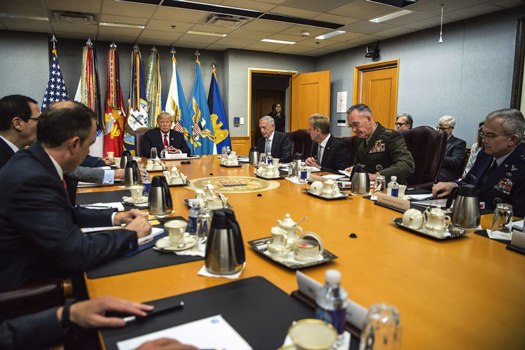
President Donald J. Trump speaks to Defense Secretary Jim Mattis and members of the National Security Council during a meeting at the Pentagon, July 20. Photo: DoD photo by Army Sgt. Amber I. Smith
|
WASHINGTON—Like clockwork, as his administration’s approval slipped to all-time lows, President Donald J. Trump managed to rattle his saber and utter bellicose nuclear threats toward the Democratic People’s Republic of Korea (DPRK), manufacturing a foreign crisis to attract political support and to draw attention away from his recent legislative failures.
“North Korea best not make any more threats to the United States,” Mr. Trump unloaded in a statement to reporters in the White House. “They will be met with fire and fury like the world has never seen. (North Korean President Kim Jong Un) has been very threatening, beyond a normal statement. And as I said, they will be met with fire, fury and, frankly, power, the likes of which this world has never seen before.”
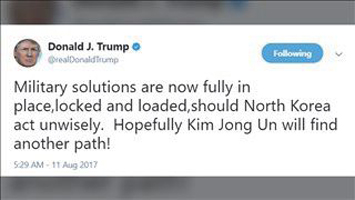
|
Tensions began to tighten when the U.N. Security Council imposed a new round of sanctions against North Korea over its test launches of two intercontinental ballistic missiles in July. The sanctions ban North Korean exports of coal, iron, lead and seafood, which would slash up to one-third of North Korea’s export revenue.
Finally, Mr. Trump tweeted that U.S. military was “locked and loaded.”
“Military solutions are now fully in place, locked and loaded, should North Korea act unwisely,” Mr. Trump tweeted. “Hopefully Kim Jong Un will find another path!”
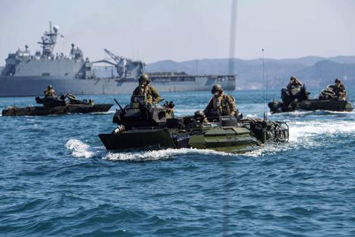
U.S. Marines with Alpha Company, Battalion Landing Team 1st Battalion, 5th Marines, 31st Marine Expeditionary Unit, conduct a combined amphibious assault on Dogu Beach, South Korea, in AAV-P7/A1 Amphibious Assault Vehicles as part of a biennial combined amphibiousexercise conducted by U.S. forces with the Republic of Korea Navy and Marine Corps, Australian Army and Royal New Zealand Army Forces Photo: (U.S. Marine Corps photo by Lance Cpl. Carl King Jr./Released)
|
“It’s an incredibly difficult, complex problem. I’m really concerned, because I don’t know where this goes in terms of a peaceful resolution,” Admiral Mullen said. “And that rhetoric, it seems to me, has taken away options or its reduced maneuver space, if you will, for leaders to make decisions.”
The countries officially remain in a state of war, with a fragile armistice (cease fire) responsible for the current cessation of hostilities. “U.S. troops are all over the continent,” Phyllis Bennis, a senior fellow at the Institute for Policy Studies said in an interview. The leaders are, “full of bombast. What do you do? Diplomacy is all that’s left.”
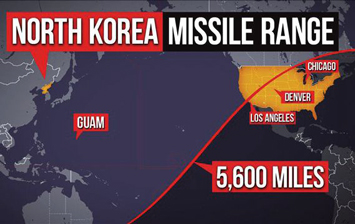
|
President Trump tried diplomacy, reaching out to President Xi Jinping of China, asking the Chinese to step in to urge the DPRK to “stop its provocative and escalatory behavior,” the White House said in readout of Mr. Trump’s conversation with President Xi. The Chinese leader urged Mr. Trump to “exercise restraint” over tensions with North Korea during the Chinese state media report of that same phone call. Mr. Xi urged both the North Koreans and the Americans not to do anything that would aggravate tensions, China’s CGTN state television network reported.
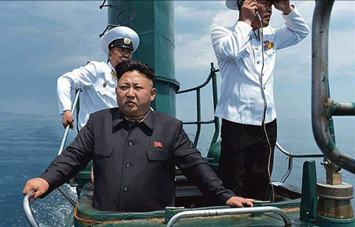
North Korean president Kim Jong Un with Naval Officers aboard a N. Korean submarine.
|
As for the intervention of China should hostilities break out, a state-owned newspaper warned that China won’t come to North Korea’s aid if it launches missiles threatening U.S. soil and there is retaliation, but it would intervene if Washington strikes first. The stern Chinese warning came as politicians around the world urged calm.
German Chancellor Angela Merkel called the escalating rhetoric “the wrong answer.” She pledged her country’s support for “any nonmilitary solutions,” telling reporters in Berlin, “I don’t see a military solution to this conflict.”
Russia’s foreign minister, Sergei Lavrov, said there had been an “overwhelming amount” of “belligerent rhetoric” from Washington and Pyongyang. “The side that is stronger and cleverer” will take the first step to defuse tensions, he said.
Nation of Islam Minister Louis Farrakhan cautioned the U.S. during his monumental 2013 lecture series “The Time and What Must Be Done,” on how it handles North Korea. “You are provoking them,” the Minister explained. “According to what we are reading in the news: You are provoking them—and they are not backing down from your provocation. And now they are absolutely rising up against you; so that in today’s news, I am hearing that you now want to ‘dial back’ some of your provocation,” he said.
“North Korea is not going to attack the United States unprovoked,” Ms. Benjamin said. “It is not going to attack the United States as a first strike. It is using its nuclear weapons and its missles as defense because it knows it’s in the cross-hairs of the U.S. military, because the U.S. military would like to overthrow the North Korean regime. Kim Jong Un, who is portrayed as a crazy man in the United States, is actually very rational when it comes to self preservation.”
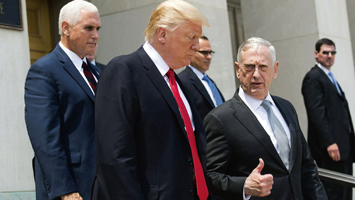
Defense Secretary Jim Mattis speaks with President Donald J. Trump and Vice President Mike Pence following a meeting of the National Security Council at the Pentagon, July 20. Photo: Dept. of Defense
|
While critics argue that North Korea can’t be permitted to continue to develop nuclear capabilities, other analysts note it is already too late and opening dialogue with the regime is necessary.
“It’s not optimum, but we have no choice. It’s magical thinking that North Korea will give up its nuclear weapons any time soon, if ever,” wrote Richard Sokolsky and Aaron David Miller in an Op-Ed published on the Carnegie Endowment For International Peace website.
“In contrast, deterring, defending against and containing the North Korean nuclear threat are all feasible and realistic options. There is no shortage of good ideas for how to apply these strategies to the Korean Peninsula—through declaratory policy, military operations, additional missile-defense deploy-ments and improvements to U.S. and South Korean forces, to name but a few,” continued the article titled, “Donald Trump, North Korea and Inconvenient Truths.” Kim does not have a death wish and is neither crazy or a madman, the article noted.
His primary motivations for acquiring an ICBM capability are defensive—to deter the United States from invading his country and overthrowing his regime, and to prevent reunification of the peninsula under South Korean control, note Mr. Sokolsky and Mr. Miller. “Why would he take actions—a nuclear attack against the United States, South Korea or Japan; or an invasion of South Korea—that would result in the very outcomes he seeks to prevent and has paid a high price in sanctions, resources and isolation to achieve?”
In a joint Op-Ed by Secretary of State Rex Tillerson and Defense Secretary Jim Mattis the men said the U.S. is not pursuing regime change or a reunification of the Korean peninsula but plan on holding “Pyongyang to account.”
There needs to be a coherent U.S. policy, we need to stop provoking North Korea, said Ms. Benjamin. “That’s the only way that North Korea can feel that it can come to the negotiating table and negotiate what it’s wanted for many decades now, which is a peace treaty with the United States and with the South.” (Final Call staff contributed to this report.)
INSIDE STORIES AND REVIEWS
-
-
About Harriett ... and the Negro Hollywood Road Show
By Rabiah Muhammad, Guest Columnist » Full Story -
Skepticism greets Jay-Z, NFL talk of inspiring change
By Bryan 18X Crawford and Richard B. Muhammad The Final Call Newspaper @TheFinalCall » Full Story -
The painful problem of Black girls and suicide
By Charlene Muhammad -National Correspondent- » Full Story -
Exploitation of Innocence - Report: Perceptions, policies hurting Black girls
By Charlene Muhammad -National Correspondent- » Full Story -
Big Ballin: Big ideas fuel a father’s Big Baller Brand and brash business sense
By Bryan Crawford -Contributing Writer- » Full Story






 Click Here Stay Connected!
Click Here Stay Connected!








